There have been a number of stories shared here on Paths to Literacy by the mother of my student, Kara, who is from the Philippines and I wanted to share my perspective as her TVI. Her earlier stories can be found below:
Kara’s Turning...
Blog Posts

Posted by Maurice Belote
What is Central Auditory Processing Disorder and Why Is It Important?
It is said that central auditory processing disorder is to hearing what cerebral visual impairment or CVI is to vision. Central auditory processing disorder (CAPD) is defined as...
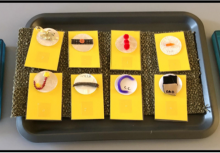
Posted by Julianne Lemman
What is PenFriend?
The PenFriend is a voice labeling system that uses a simple device to create recordings associated with sticker labels. The user taps a sticker with the PenFriend, makes a voice recording, then the PenFriend saves the voice recording...

Posted by Flavia Moreira
Children with multiple disabilities and visual impairments face difficulties in accessing information and often have limited communication. These children are part of a general heterogeneous group, with visual impairment (blindness or low vision) being a...
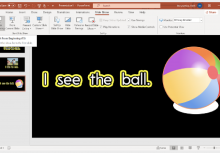
Posted by Beth Borysewicz
This presentation and step-by-step instruction was created to assist a Kindergarten team of teachers, as well as the student’s parent, as the child was beginning to learn his sight words. I created this to assist the team and show the process of...

Posted by Adam Wilton
An animated PowerPoint story is designed to enhance the literacy experience by using movement and color to make a simple story more engaging for children who benefit from and qualify for alternate format literacy materials. It takes some time and effort...

Posted by Allison Mello
I am a braillist, and this semester I have been working with a TVI in supporting pre-braille skills in a new preschool student. I am also at the end of my first year of grad school to become a TVI, so prior to this semester I had no experience teaching the...
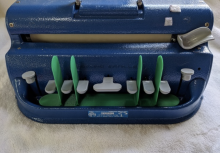
Posted by Charlotte Cushman
Many young children and beginning braille users struggle to keep their fingers on the correct keys when using a braillewriter. While we always want to encourage them to keep their fingers in the correct place, sometimes it's helpful to create ways...

Posted by Amy Flores
The student with CVI (Cortical/Cerebral Visual Impairment) in Phase I (Roman-Lantzy, 2018) is building visual behavior. Remote learning takes place via two-dimensional (2-D) screens. Information is shared—visually and auditorily—...
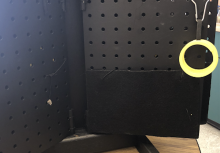
Posted by Leslie Hagood
I created this pegboard book for a second grader with CVI that I worked with in Southern Oregon. He was in a wheelchair, had limited hand/arm strength, and showed difficulty with visually attending to objects, tracking, shift-of-gaze, and using a visually-...
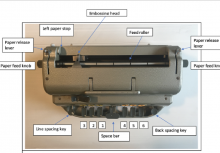
Posted by Laurie Hudson
Like many teachers of the visually impaired, I have often introduced people to Perkins Braillewriters. I’ve shown this tool to not only my students, but also to their families and their teachers and classmates if they are in inclusion settings....
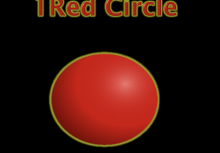
Posted by Deborah Fenton
and Patrice Bucheli
Goal
We put together this PowerPoint for our students with CVI and it was used based on a student's CVI Range Score. The goal was to provide 2-D images and concepts that allowed us to work on a variety of lessons to discuss...

Posted by Nilam Agrawal
When remote learning started, post spring break in the 2020 COVID world, I was suddenly given a front row seat to my daughter’s academic life, a rare departure from our life before. By way of background, my daughter is 11 years old and is in the 5th...
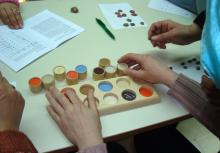
Posted by Marnee Loftin
Collaborative evaluations have become an increasingly popular style of evaluating students in the school setting. Different professions identifying strengths and needs, as well as developing comprehensive recommendations, is a powerful model. With...
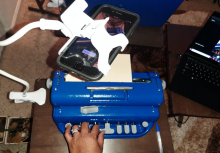
Posted by Champagne Marsh-Williams
Due to the Covid-19 pandemic and the quarantining measures enacted as a result, virtual learning and meetings have become necessary to assist professionals with conducting their duties in a remote environment. Virtual team collaboration platforms have...
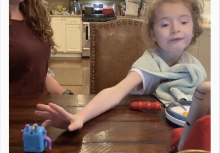
Posted by Chris Russell
Visually-guided reach (VGR) is a skill that we typically assess and often try to promote in our students, but what about students who have limited motor control and may not be able to extend their arms or control their reach at all? Many students with...
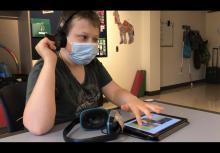
Posted by Julianne Lemman
Pictello is an iOS app made by AssistiveWare that can be used to create experience stories and social stories using pictures, text, audio recordings, and video. Pictello can be used to build literacy skills, social skills, communication, social-emotional...

Posted by Regina Quaid
Now that the majority of us have been practicing social distancing and we have not had a chance to meet with families and students in person, family events have drastically changed for most schools. Students are holding virtual concerts and programs, parents...
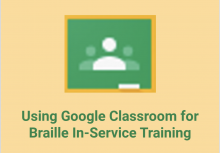
Posted by MLimburg
Due to the Covid-19 pandemic, the Connecticut Department of Aging and Disability Services Bureau of Education and Services for the Blind’s Children’s Services presented our “Braille Day” annual fall in-service in a virtual format using...

Posted by Chris Montgomery
Foundation for Well-Being and Quality of Life
Human interaction begins in infancy. From when a baby and mother share a moment’s gaze - maybe at the buttons on the shirt that mother is wearing – the process of human interaction is being...

